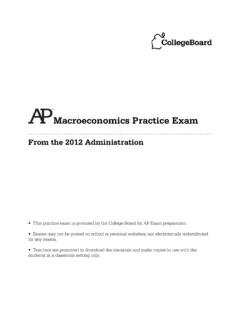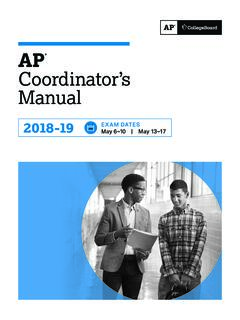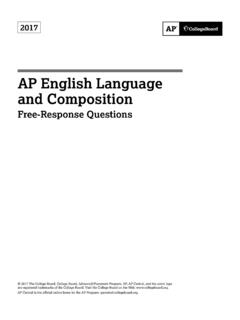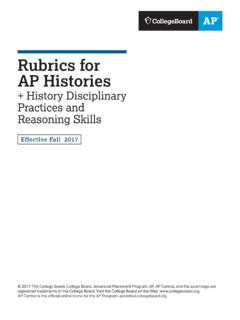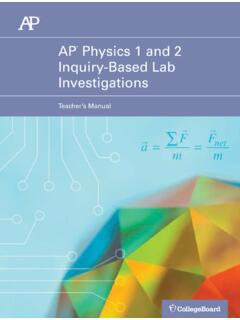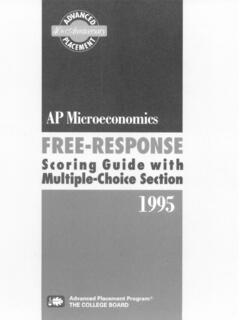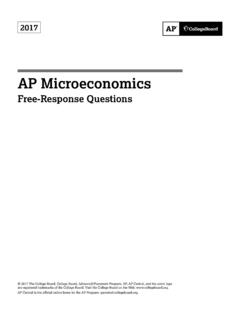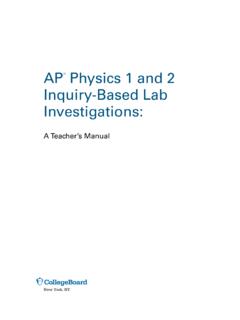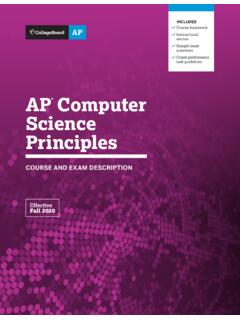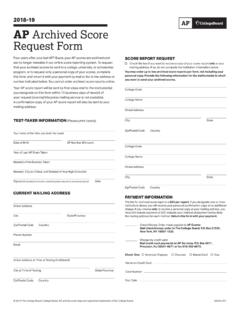Transcription of AP European History
1 INCLUDES C ourse framework Instructional section S ample exam questionsAP European HistoryCOURSE AND EXAM DESCRIPTIONE ffective Fall 2020AP COURSE AND EXAM DESCRIPTIONS ARE UPDATED PERIODICALLYP lease visit AP Central ( ) to determine whether a more recent course and exam description is Fall 2020AP European HistoryCOURSE AND EXAM DESCRIPTIONA bout College BoardCollege Board is a mission-driven not-for-profit organization that connects students to college success and opportunity. Founded in 1900, College Board was created to expand access to higher education. Today, the membership association is made up of over 6,000 of the world s leading educational institutions and is dedicated to promoting excellence and equity in education.
2 Each year, College Board helps more than seven million students prepare for a successful transition to college through programs and services in college readiness and college success including the SAT and the Advanced Placement Program. The organization also serves the education community through research and advocacy on behalf of students, educators, and further information, visit Equity and Access PolicyCollege Board strongly encourages educators to make equitable access a guiding principle for their AP programs by giving all willing and academically prepared students the opportunity to participate in AP. We encourage the elimination of barriers that restrict access to AP for students from ethnic, racial, and socioeconomic groups that have been traditionally underrepresented.
3 Schools should make every effort to ensure their AP classes reflect the diversity of their student population. College Board also believes that all students should have access to academically challenging coursework before they enroll in AP classes, which can prepare them for AP success. It is only through a commitment to equitable preparation and access that true equity and excellence can be : Sonny Mui and Bill Tully 2020 College Board. College Board, Advanced Placement, AP, AP Central, and the acorn logo are registered trademarks of College Board. All other products and services may be trademarks of their respective College Board on the web: v Acknowledgments 1 About AP 4 AP Resources and Supports 6 Instructional Model 7 About the AP European History Course 7 College Course Equivalent 7 PrerequisitesCOURSE FRAMEWORK 11 introduction 13 Course Framework Components 15 Historical Thinking Skills and Reasoning Processes 19 Course Content 24 Course at a Glance 29 Unit Guides 31 Using the Unit Guides 33 UNIT 1: Renaissance and Exploration 57 UNIT 2: Age of Reformation 73 UNIT 3: Absolutism and Constitutionalism 91 UNIT 4.
4 Scientific, Philosophical, and Political Developments 107 UNIT 5: Conflict, Crisis, and Reaction in the Late 18th Century 125 UNIT 6: Industrialization and Its Effects 145 UNIT 7: 19th-Century Perspectives and Political Developments 165 UNIT 8: 20th-Century Global Conflicts 187 UNIT 9: Cold War and Contemporary EuropeINSTRUCTIONAL APPROACHES 215 Selecting and Using Course Materials 216 Instructional Strategies 220 Developing Historical Thinking Skills 231 Developing the Reasoning ProcessesEXAM INFORMATION 235 Exam Overview 241 Sample Exam Questions 256 AP History RubricsSCORING GUIDELINES 261 Part B: Short-Answer Question with Primary Source 262 General Scoring Notes 264 Document-Based Question 268 General Scoring Notes 269 Scoring Guidelines for Document-Based Question 275 Document Summaries 276 Long Essay Question 277 General Scoring Notes 278 Scoring Guidelines for Long Essay QuestionAPPENDIX 285 Appendix: AP European History Concept OutlineAcknowledgmentsCollege Board would like to acknowledge the following committee members, consultants, and reviewers for their assistance with and commitment to the development of this course.
5 All individuals and their affiliations were current at the time of Alexander, Norfolk State University, Norfolk, VAStanley Chodorow, University of California, San Diego, San Diego, CAPaul Deslandes, University of Vermont, Burlington, VTJennifer L. Foray, Purdue University, west Lafayette, INChristopher Freiler, Hinsdale Central High School, Hinsdale, ILMichael Galgano, James Madison University, Harrisonburg, VADiego Gonzalez, Benjamin Franklin High School, New Orleans, LAJeff Hamilton, Baylor University, Waco, TXOliver Holmes, Wesleyan University, Middletown, CTKim Jago, Tampa Preparatory School, Tampa, FLLloyd Kramer, University of North Carolina at Chapel Hill, Chapel Hill, NCCarolyn Lougee, Stanford University, Stanford, CAPatricia McGloine, Princess Anne High School, Virginia Beach, VAGordon Mork, Purdue University, west Lafayette, INPatricia Nardi, George W.
6 Hewlett High School, Hewlett, NYWendy Owen-Bumsted, Formerly at St. John s-Ravenscourt School, Winnipeg, MB, CanadaKaren Phillips, Pope John Paul II High School, Hendersonville, TNCarol Pixton, Polytechnic School, Pasadena, CAKelly Saenz, Westwood High School, Austin, TXJohn Sauerman, The Lawrenceville School, Lawrenceville, NJBonnie Smith, Rutgers University, New Brunswick, NJEmily Tai, Queensborough Community College, Bayside, NYVictoria Thompson, Arizona State University, Tempe, AZNatasha Vasavada, Formerly at Livingston High School, Livingston, NJCollege Board StaffSara Hunter, Associate Director, AP Curricular PublicationsDaniel McDonough, Senior Director, AP Content IntegrationAmy Smallwood-Ringenberg, Director.
7 Instructional Design and PD Resource DevelopmentKelly Stromberg, Senior Director, AP European History Content DevelopmentAllison Thurber, Executive Director, Curriculum and Assessment SPECIAL THANKS Christopher Budano and John R. Williamson | vAP European History Course and Exam DescriptionReturn to Table of Contents 2020 College BoardTHIS PAGE IS INTENTIONALLY LEFT APCollege Board s Advanced Placement Program (AP ) enables willing and academically prepared students to pursue college-level studies with the opportunity to earn college credit, advanced placement, or both while still in high school. Through AP courses in 38 subjects, each culminating in a challenging exam, students learn to think critically, construct solid arguments, and see many sides of an issue skills that prepare them for college and beyond.
8 Taking AP courses demonstrates to college admission officers that students have sought the most challenging curriculum available to them, and research indicates that students who score a 3 or higher on an AP Exam typically experience greater academic success in college and are more likely to earn a college degree than non-AP students. Each AP teacher s syllabus is evaluated and approved by faculty from some of the nation s leading colleges and universities, and AP Exams are developed and scored by college faculty and experienced AP teachers. Most four-year colleges and universities in the United States grant credit, advanced placement, or both on the basis of successful AP Exam scores; more than 3,300 institutions worldwide annually receive AP Course DevelopmentIn an ongoing effort to maintain alignment with best practices in college-level learning, AP courses and exams emphasize challenging, research-based curricula aligned with higher education teachers are responsible for designing their own curriculum for AP courses, selecting appropriate college-level readings, assignments, and resources.
9 This course and exam description presents the content and skills that are the focus of the corresponding college course and that appear on the AP Exam. It also organizes the content and skills into a series of units that represent a sequence found in widely adopted college textbooks and that many AP teachers have told us they follow in order to focus their instruction. The intention of this publication is to respect teachers time and expertise by providing a roadmap that they can modify and adapt to their local priorities and preferences. Moreover, by organizing the AP course content and skills into units, the AP Program is able to provide teachers and students with free formative assessments Personal Progress Checks that teachers can assign throughout the year to measure student progress as they acquire content knowledge and develop skills.
10 Enrolling Students: Equity and AccessCollege Board strongly encourages educators to make equitable access a guiding principle for their AP programs by giving all willing and academically prepared students the opportunity to participate in AP. We encourage the elimination of barriers that restrict access to AP for students from ethnic, racial, and socioeconomic groups that have been traditionally underserved. College Board also believes that all students should have access to academically challenging coursework before they enroll in AP classes, which can prepare them for AP success. It is only through a commitment to equitable preparation and access that true equity and excellence can be AP Courses: The AP Course AuditThe AP Program unequivocally supports the principle that each school implements its own curriculum that will enable students to develop the content understandings and skills described in the course framework.
